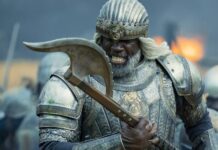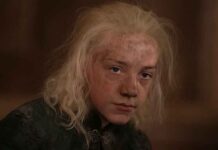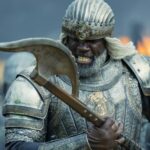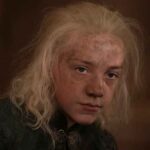Alfie Allen finally earned his first Emmy nomination for the final season of “Game of Thrones,” where he plays Theon Greyjoy. The actor notably submitted himself for consideration after HBO decided not to push him, and was successfully nominated in Best Drama Supporting Actor.
Allen recently spoke with Gold Derby senior editor Rob Licuria about his reaction to getting that first Emmy nomination, the redemption of Theon and how he’s ready to move on from “Game of Thrones.” Watch the exclusive video interview above and read the complete transcript below.
Gold Derby: Alfie, first of all, congratulations on your Emmy nomination. Talk us through the morning of the announcement when you found out you were nominated.
Alfie Allen: Thank you so much, man. I was in the West End and I was picking up something from the shop and I got a text, I think, from my agent, saying, “Congratulations on the nomination,” and I said, “Oh, amazing. It’s for Best Drama or something?” They go, “No, individually nominated.” I still am in shock about it. I wasn’t expecting it because all that had faded into ridiculousness that that would even happen. I’m not gonna lie, when I first started “Thrones,” there was a part of me that was like, “Maybe one day I’ll get an opportunity to be up for an award.” But it all faded into, “Definitely wasn’t going to happen.” It wasn’t I didn’t have any hope, it just wasn’t realistic. For it to happen is just insane but yeah, I tried to call all of my family members, couldn’t get through to any of them so I had a glass of champagne with the lady in the shop to celebrate it and she thought it was really funny. And then I left and went to a screening of “The Great Hack” and my phone kept on going off and going off. So I only made it through an hour of the screening and I had to leave just to indulge in myself. It was great. It was a day that I will never, ever forget ‘cause it’s mad. Not mad, it was just unreal.
GD: Isn’t it lovely that you’re nominated as a supporting actor alongside your castmates Peter [Dinklage] and Nikolaj [Coster-Waldau]? After all that your character has been through, it’s fitting that he’s finally being recognized and you’re being recognized. What does it mean to you to be recognized by the industry in this way?
AA: First and foremost, speaking to you now when you say fan-favorite Theon, I never heard those words throughout the whole eight or nine years when I was doing “Thrones.” The character was hated and almost reviled is the right word to use. So to have the character bow out on that moment of honor and redemption and have the fans go through that as well as myself go through it, is nice because it means, like you say, the fans now think I’m a favorite. It’s a nice feeling. But in terms of career-wise, I try not to see my career as a point of trajectory or trying to get one particular place because I just want to enjoy myself, really. So I would say my landscape professionally does feel like it’s changed somewhat. I’m still having to pinch myself to make sure it’s all real. It’s great. I’m so happy and just wanna make sure that if I’m going into a next phase of my career that I treat it with respect.
GD: Yeah, and it’s funny how if you look at fan reaction, as you say, sometimes Theon was reviled by fans and then sometimes he’s loved. Everyone that I speak to loves the character so I don’t know what they’re talking about. But it reminds me of the finale and the final season how the fan reaction was mixed. Some people loved it. Some people hated it. What were your thoughts on the reaction to the final season and what did you think of it yourself?
AA: I watched it all in one lot. I recorded it on my digital box and then watched from Episode 1 to 6, just all in one go. I know there was a number of people, and obviously, the numbers involved in “Game of Thrones” means that even if it’s a small number of people it’s still a lot of people, who weren’t happy with how it ended. Me personally, I only really caught onto that online reaction quite late on because I just don’t look at all that stuff. I thought that Dave [Benioff] and Dan [Weiss] did a good job. They must’ve been under immense pressure to get it right, and having lived with these characters and this world for so long, they must’ve been dying to get it right. I think that they did. HBO set out to do a fantasy show that was steeped in familial relationships, and those were at the core of it. The last three episodes did that. It rounded up those relationships that were so important to the story and I didn’t feel like it was done hastily. I didn’t think it was crap. But I think some people did.
GD: Yeah, I guess everyone’s got an opinion, I suppose. Looking back over the whole series and particularly the final episode for you, I was thinking of some highlights and for me, one of the best moments of the season was when Theon returned to Winterfell, turned to Sansa and declared he wanted to fight for Winterfell. It was really great seeing how you both embraced and so much appears to wash over your character’s face in that scene. Talk us through doing that scene and whether or not it was a highlight for you.
AA: I think there were so many genuine emotions flowing around in the last season because obviously, it was the last season, so seeing Sansa again was a massive thing for Theon. I think that just to know that she was okay and also have the relationship of Daenerys and Sansa developing in the room at that same time, Theon’s not akin to any of this knowledge. I always loved acting with Soph[ie] Turner ‘cause she just manages to be listening to one direction… Sorry, that sounds really rude. I don’t mean that. She’ll be listening to some pop music or something and then just comes into scene, and just bang, no effing about. She’s just in there straight away. To see that from someone who you kind of grew up with, she was a little girl, and now she’s just smashing these scenes in front of me was great.
GD: Looking back a little earlier, Theon succumbs to the evil Ramsay Bolton and becomes Reek. How difficult and challenging was it to play that difficult aspect of his character?
AA: It was ultimately taxing, at times, going from Theon to Reek to this person who was Reek pretending to be Theon and then going back to Theon. It was confusing at times. It was funny, I was on the plane on the way over and this lady came up to me and she said, “Oh my god, I’ve just been on the phone with my son and I told him you were on the plane,” and she was like, “I’m on the plane with Reek.” And then her son went, “Mom! His name is Theon. You have to call him Theon. Okay?” She genuinely had to step back for a moment from what her son had told her. So it was funny. In terms of those moments, they stay with me, not going home after set and still being in character but those moments and how fans reacted to them, they stay with you. Equally now, the character is more in a positive light. I know you say that it always has been in a positive light but to have that kind of turnaround is nice because the fans feel that way about me and the character. So yeah, those dark moments do stay with you but the positive ones do as well.
GD: Thinking over the arc your character takes over the seasons, you’re quite lucky that you got a really nice arc. As I said earlier, he’s come full circle and he’s a really complicated and nuanced character. I think a lot of what drives him, from my perspective, is his identity, who he is and who he wants to be and who he’s aligned with. How satisfying was it to play this guy who by the end was quite steadfast, resilient and strong? How did you feel at the end of it? Did you feel like you had come full circle?
AA: I think he only really comes full circle in those last moments. I still think he’s having that struggle up until his very, very last moments and then morbid as it may be, that’s what they say, isn’t it? People have those struggles your whole life and if you don’t address them and try and do something about it and take care of your mental health, you’ll be on your deathbed and realize these huge moments of clarity that you have when you’ve only got so much of your life left. I think we all owe it to ourselves to work through those things and not have an identity crisis.
GD: Watching “The Last Watch,” the documentary about the show and particularly the final episode, I found it really heartbreaking to watch the cast do that table read and find out where certain characters were gonna die. It made me realize that these actors are really emotionally invested in what’s happening, their characters and their friends’ characters. Can you talk us through that dynamic, especially given that you were there from the beginning? As you said earlier, Sophie was just a girl. You were all so much younger and you’ve grown up together. How invested are you all in your characters and in your colleagues’ characters?
AA: I can’t really speak for anyone else but for me, certain characters shared similar motivations. Jon Snow and Theon have that thing where they are both going through an identity crisis and don’t really know where their characters belong as people in the role of being a Highborn in the world of “Game of Thrones.” Obviously, mine and Gwendoline [Christie]’s character actually had similar things in common in terms of having to deal with certain layers that were there for people to see. Also, Jaime and Theon’s character have that kind of same journey of being these cocksure, entitled brats to start off with, or perceived as that, and then they go through this journey, this path of being humbled somewhat. So they have to find the humanity within themselves through being broken down. I was emotionally invested in my character but I can’t really speak for other people. I know that I am emotionally invested in other people’s characters without a doubt. I think that’s only a good thing.
GD: Do you really miss the show and the cast or were you happy to let that go and move forward?
AA: I was happy to let that go and move forward. I’m not gonna miss the cast because they’re my friends and I see them, so I always keep in contact with them. I’m gonna miss the feeling of going off to Belfast and feeling like we’re all going to school. That was great. But I am gonna miss that feeling because you literally are a very, very, very lucky person if you have that in any kind of work environment you’re in. To have that in the scope of something like “Game of Thrones” and being an actor is something I will never, ever forget and be eternally grateful to David and Dan for making me a part of it, and George [R. R. Martin] for creating the characters in the first place. I’m happy to move on, man. I’m definitely happy to move on.
GD: I can imagine. You were on the biggest show on the planet and it’s also a genre show so fans of that particular genre tend to be really crazy or at least really invested. Have you found that your life has completely changed and everywhere you go, people wanna talk about Theon or “Game of Thrones”?
AA: Yeah, I think the accurate thing to say would be how it hasn’t changed my life, because it has changed in every respect. I’ve not really had any moments of weird fandom. If everyone’s nice, I don’t mind. Obviously, people related to Theon’s trauma and his PTSD and I think it’s important that we all talk about that openly moving forward without a shadow of doubt. It’s all just positive for me. I don’t really see the negative in it. It’s great.
GD: The show now has received a historic 32 nominations. Much has been made about how you submitted yourself on the ballot as well as Gwendoline and Carice [van Houten]. All three of you made the cut, which is so exciting. Is there a sense of vindication amongst yourself and your colleagues that this is the biggest show on the planet, it’s got record-breaking Emmy nominations and you’ll probably all end up winning a bunch of them on Emmy night? Do you feel vindicated?
AA: It was hard. A lot of times going through it, it was hard because people might be coming up to me and saying, “Wow, man, thank you so much. You’ve done such a great job.” Obviously, there’s parts of myself, I don’t really like watching myself onscreen and I’m not totally ever gonna be 100% sure if people are, “Are you saying this to me just because you’re here and you’re in front of me and you’re being nice?” So it’s nice to have a pat on the back from the academy, from the people who vote for the Emmys. It does feel vindicating and it feels like validation.
GD: I like that. I think that’s worthwhile and we really appreciate your time today. Good luck on Emmy night, you never know what could happen.
AA: Who knows, man? I know it sounds like a soundbite but seriously, 80% of it is just being there and then I get to share it with people who are literally my close friends. It’s cloud nine stuff and I’m so thankful that I get to be there and say goodbye to it in a positive way. It’s great.




















![[Book Review] The Blade Itself (The First Law Trilogy) by Joe Abercrombie](https://bendthekneegot.com/wp-content/uploads/2018/01/1516047103_maxresdefault-218x150.jpg)


















